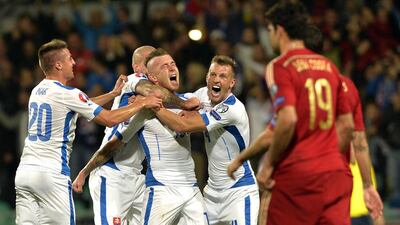International football during the winter continues to polarise.
Football fans love the World Cup finals and major championships – that was evident by the attention and reaction the action in Brazil got in the summer.
But when it comes to qualifying matches, for these finals and major championships, the love diminishes somewhat, turning to apparent apathy as it breaks up the excitement of domestic leagues in Europe and across the world.
Yet that attitude, on paper, is unfair towards some of the football that has been on offer.
The first three days of the latest 2016 European Championship qualifying week has thrown up some real shocks not seen in years.
On Saturday night, in front of a hysterical crowd in Warsaw, Poland pulled off one of the results of the year by beating world champions Germany 2-0 to record their first win against their neighbours.
Two days earlier, European champions Spain were stunned 2-1 in Slovakia, a scoreline almost unthinkable mere months ago.
Then there is the surprise team of the moment, Albania. They followed last month’s 1-0 win over Portugal with 1-1 draw against Denmark.
Sadly those shock losses for Spain and Germany are likely to prove irrelevant in the grand scheme of things. Clearly, international football can still surprise in one-off matches.
But, thanks to the competition’s latest format, not in any meaningful, sustainable manner.
Euro 2016 in France will be the first to host 24 teams, rather than 16, which had been the case at the previous five, resulting in a qualifying campaign that is little more than a procession.
Eight groups of six, and one group of five. Alongside the hosts France, the top two from each qualifies automatically, as does the best third-place team. The eight other third-place teams then compete in two-legged play-offs for the remaining four slots.
For Europe’s top teams, it is harder to be eliminated than to qualify.
For Germany and Spain, expect normal service to be resumed, despite their early blips.
Spain, for instance, have dropped points to Slovakia and could conceivably lose points to Ukraine, too, along the way.
But to not even make the play-offs in third spot, if they finished behind those two in the standings, they would need to also finish behind one of Belarus, Macedonia and Luxembourg, who are placed respectively in the Fifa rankings at Nos 89, 112 and 127, making it an unlikely scenario.
That is the case in the majority of the groups, with the big nations possibly having competition from one other country, but not enough to miss out on second or third spots.
Uefa claims that the new system provides middle-ranked nations a better chance of making the finals, which is not really true. All the new system does is ensure that the four or five relatively big teams that occasionally missed out are no longer realistically at risk; at a stretch, only a handful of middle-tier countries stand to benefit at all.
This will render the majority of the groups almost irrelevant. With 268 matches needed to eliminate 26 of Uefa’s 54 member states, genuinely brilliant wins like Poland’s or Slovakia’s will have less impact as, while it boosts their own qualification aspirations, the drama is softened by the lack of consequence for their opponent.
It was not always like that. In 1983, a gifted but still relatively unknown Denmark team visited Wembley Stadium and beat England 1-0 thanks to an Allan Simonsen penalty.
That generation of Danish players became one of the world’s most admired teams, yet, at the time, the result was a shock.
Significantly, it meant England failed to qualify to the 1984 European Championships in France – a time when only eight teams qualified for the finals and one slip up in qualification could, and did, prove decisive.
With Europe’s changing geography in the post-communism era and the aftermath of the Balkans War, it was inevitable that the competition would be expanded to host 16 teams in 1996.
Still, the quality endured, with Euro 2000 held in Holland and Belgium arguably the last truly great international tournament.
Increasingly, Europe’s traditional superpowers have become practically certain of their places in the finals, although Steve McClaren’s England still managed to miss out on the 2008 finals in Austria and Switzerland.
Those days look to be gone forever. Uefa will insist that the big boys are always likely to fill up the qualifying places, no matter the route.
That may be true, except now they do not really have to sweat to get there.
akhaled@thenational.ae
Follow our sports coverage on twitter at @SprtNationalUAE

